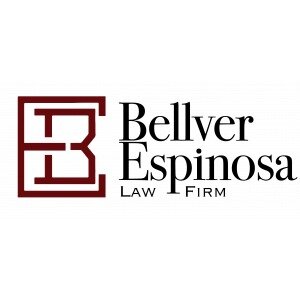Best Oil, Gas & Energy Lawyers in Puerto Rico
Share your needs with us, get contacted by law firms.
Free. Takes 2 min.
Or refine your search by selecting a city:
List of the best lawyers in Puerto Rico
About Oil, Gas & Energy Law in Puerto Rico
Puerto Rico, as an unincorporated territory of the United States, follows a unique legal landscape specifically when it comes to energy resources. Historically, the island has been heavily reliant on imported fossil fuels, primarily oil, for its energy needs. However, recent years have seen a significant push towards diversifying energy sources, with an emphasis on renewable energy like solar and wind. This shift is part of a larger movement to build a more resilient and sustainable energy grid, especially in the wake of natural disasters that have exposed vulnerabilities in the island's energy infrastructure.
Why You May Need a Lawyer
Several scenarios may necessitate the expertise of a lawyer specializing in Oil, Gas & Energy law in Puerto Rico:
- Regulatory Compliance: Businesses navigating the complex web of local and federal regulations in the energy sector often require legal assistance to ensure compliance.
- Contractual Agreements: Whether it’s negotiating deals for energy projects, or understanding the implications of existing contracts, legal guidance is crucial.
- Environmental Impact: Companies must adhere to environmental laws and may need legal advice on how best to align with these requirements.
- Dispute Resolution: Conflicts may arise between businesses, landowners, or government entities that require legal mediation or representation.
- Permitting and Licensing: Legal professionals can assist in securing the necessary permits for oil and gas exploration, or for setting up renewable energy installations.
Local Laws Overview
In Puerto Rico, local laws relating to Oil, Gas & Energy are impacted by both territorial statutes and federal law. Key aspects include:
- Energy Policy Modernization Act: This aims to increase the use of renewable energy through various incentives and mandates.
- Public-Private Partnership (P3) Authority: Facilitates collaboration between the public and private sectors in developing energy projects.
- Environmental Quality Board (EQB): Ensures that energy projects meet environmental standards and sustainability goals.
- Permitting and Regulations: Comprehensive regulations govern the permitting processes for energy-related construction and development.
- Net Metering Laws: These laws allow consumers to sell excess energy back to the grid, promoting the use of renewable energy sources like solar power.
Frequently Asked Questions
What is the main source of energy in Puerto Rico?
Historically, Puerto Rico has relied heavily on imported fossil fuels, mainly oil. However, there is an ongoing shift towards renewable energy sources such as solar and wind.
Are there incentives for renewable energy in Puerto Rico?
Yes, the government provides various incentives, including tax credits and rebates, to encourage the use and development of renewable energy sources.
What should I consider when investing in an energy project in Puerto Rico?
Individuals should consider regulatory compliance, financial incentives, potential environmental impacts, and the availability of technical support.
How does the permitting process work for energy projects?
The permitting process involves multiple steps, including environmental assessments, community consultations, and approvals from various governmental bodies.
What are the challenges in the energy sector in Puerto Rico?
Challenges include grid reliability, high energy costs, dependence on imported fuels, and regulatory complexities.
How can businesses ensure compliance with local energy laws?
Businesses can ensure compliance by working with legal experts who specialize in the energy sector to navigate local and federal regulations.
Can individuals sell excess solar energy back to the grid?
Yes, through net metering programs, individuals can sell excess energy back to the island’s grid, reducing their overall electricity costs.
What role does the Puerto Rico Energy Bureau play?
The Puerto Rico Energy Bureau regulates the island's energy market, implements energy policy, and ensures consumer protection in. energy-related matters.
How are energy disputes typically resolved?
Disputes can be resolved through negotiation, mediation, or litigation, often requiring legal representation to navigate complex regulatory and contractual issues.
Are there local organizations that assist in energy transition efforts?
Yes, organizations like the Puerto Rico Energy Commission and various non-profits focus on supporting the island's transition to sustainable energy practices.
Additional Resources
For those seeking further information or assistance in Oil, Gas & Energy matters in Puerto Rico, consider the following resources:
- Puerto Rico Energy Bureau: The regulatory authority overseeing energy matters on the island.
- Department of Economic Development and Commerce (DDEC): Provides information on energy policies and incentives.
- Environmental Quality Board (EQB): Ensures environmental compliance in energy projects.
- Energy Public Policy Program (EPPP): Offers insights into current energy policies and initiatives.
- Local Law Firms Specializing in Energy: Numerous legal practices on the island specialize in energy and can provide tailored advice.
Next Steps
If you need legal assistance in Oil, Gas & Energy in Puerto Rico, consider the following steps:
- Identify Your Legal Needs: Understand your specific legal requirements, whether for compliance, contract negotiation, or dispute resolution.
- Research Legal Professionals: Look for attorneys or firms experienced in energy law to ensure you're getting informed and relevant legal advice.
- Schedule Consultations: Meet with potential legal advisors to discuss your case and understand their approach to your situation.
- Gather Documentation: Prepare all necessary documents and information to provide your lawyer with a comprehensive view of your situation.
- Communicate Clearly: Discuss your goals and concerns openly with your legal advisor to ensure mutual understanding and effective representation.
Lawzana helps you find the best lawyers and law firms in Puerto Rico through a curated and pre-screened list of qualified legal professionals. Our platform offers rankings and detailed profiles of attorneys and law firms, allowing you to compare based on practice areas, including Oil, Gas & Energy, experience, and client feedback.
Each profile includes a description of the firm's areas of practice, client reviews, team members and partners, year of establishment, spoken languages, office locations, contact information, social media presence, and any published articles or resources. Most firms on our platform speak English and are experienced in both local and international legal matters.
Get a quote from top-rated law firms in Puerto Rico — quickly, securely, and without unnecessary hassle.
Disclaimer:
The information provided on this page is for general informational purposes only and does not constitute legal advice. While we strive to ensure the accuracy and relevance of the content, legal information may change over time, and interpretations of the law can vary. You should always consult with a qualified legal professional for advice specific to your situation.
We disclaim all liability for actions taken or not taken based on the content of this page. If you believe any information is incorrect or outdated, please contact us, and we will review and update it where appropriate.
Browse oil, gas & energy law firms by city in Puerto Rico
Refine your search by selecting a city.












